Matcha is a popular green tea powder that many people are incorporating into their diets due to its numerous health benefits. While it has many advantages, some people are concerned that matcha can stain their teeth. This article will explore whether matcha can indeed stain your teeth and what you can do to minimize the risk of staining.Matcha is a type of powdered green tea that is traditionally used in Japanese tea ceremonies. It is made from shade-grown tea leaves that are ground into a fine powder, which can then be whisked with hot water or used in cooking and baking. Matcha has a unique flavor profile and numerous health benefits due to its high levels of antioxidants, minerals, and caffeine.
Does Matcha Stain Teeth?
Matcha is a popular green tea powder that has become increasingly popular for its health benefits. But while it may be healthy, it can also have an effect on your teeth. Matcha is known to stain teeth, which can be a cause of concern for some people.
When consumed, the polyphenols in matcha can bind to the proteins in your enamel and cause staining. This staining can vary from person to person, but it is generally more noticeable in those with lighter colored teeth or those who consume matcha regularly. Thankfully, there are some ways to minimize the staining effects of matcha on your teeth.
Brushing your teeth immediately after drinking matcha can help to reduce the amount of staining that occurs. Additionally, drinking water after consuming matcha will help rinse away any residue and further reduce staining. For those who are particularly concerned about the effects of matcha on their teeth, using a straw when drinking may help limit contact with the enamel and reduce staining.
While matcha does have a tendency to stain teeth, it is important to remember that this effect is not permanent and can be minimized with proper dental care. Regular brushing and flossing can help keep your teeth healthy and white even if you do enjoy matcha tea regularly.
What Causes Teeth Staining?
Teeth staining can be caused by a variety of things such as smoking, certain beverages, and certain foods. Smoking leaves dark stains on the teeth which can be very difficult to remove. Drinking beverages such as coffee, tea, and red wine can also cause staining on the teeth. Foods like curry, berries, and tomato sauce can also leave a residue on the teeth which causes them to become discolored over time.
In addition to these external factors, poor oral hygiene can lead to discoloration of the teeth as well. Plaque buildup and tartar accumulation will cause yellowing of the teeth due to bacteria eating away at the enamel and causing discoloration. Regular brushing and flossing are essential for maintaining good oral hygiene and preventing staining of the teeth.
Lastly, certain medications can cause discoloration of the teeth as well. Certain antibiotics such as tetracycline have been known to cause yellowing of the teeth in children and their developing teeth while adults may experience more general staining from these medications. It is important to talk with your doctor or dentist if you are taking any medications that may be causing staining of your teeth.
Overall, there are many different factors that can lead to discoloration of the teeth including smoking, drinking certain beverages, eating certain foods or having poor oral hygiene. It is important to practice good dental habits such as brushing twice a day and flossing regularly in order to prevent staining of the teeth from occurring due to plaque buildup or other external sources. Additionally, if you are taking any medications it is important to talk with your doctor or dentist about potential side effects that could affect your oral health.
Matcha and Teeth Staining
Matcha has become increasingly popular in recent years, thanks to its numerous health benefits. But how does this tea affect teeth staining? Many people worry that the brightly colored green powder can lead to discoloration of the teeth. Fortunately, this is not the case. While Matcha may temporarily stain the teeth, it is not known to cause any permanent damage or discoloration.
The main reason Matcha does not have a lasting effect on teeth staining is because of its pH level. Matcha has a pH of around 8, which is slightly alkaline. This makes it less likely to cause discoloration or staining on the surface of the tooth enamel. The same cannot be said for other acidic beverages like coffee and wine, which are known to have a significant effect on tooth enamel over time.
In addition to its low pH level, Matcha also contains antioxidants that can help protect your teeth from damage caused by bacteria and other environmental factors. The polyphenols in Matcha are especially beneficial for oral health as they can help reduce inflammation in the gums and prevent bacterial growth in the mouth.
It’s important to note that while Matcha may not have a lasting effect on teeth staining, it’s still important to practice good oral hygiene habits such as brushing and flossing regularly in order to keep your smile looking its best. Drinking plenty of water throughout the day can also help prevent staining caused by other beverages or foods. If you do notice any discoloration due to Matcha or any other beverage or food, it’s best to consult with a dentist who can provide advice on how best to address it.
Does Matcha Have More Caffeine Than Coffee?
Matcha is a traditional Japanese green tea powder made from grinding up high-quality green tea leaves. It is known for its intense flavor and health benefits. But does matcha have more caffeine than coffee?
The answer is yes, matcha does have more caffeine than coffee. A cup of matcha contains about 70mg of caffeine, compared to 40mg in an average cup of drip-brewed coffee. However, the caffeine in matcha is released slowly over several hours, so it tends to be less stimulating than coffee.
Matcha also contains a unique type of amino acid called L-theanine. This amino acid helps to balance out the stimulating effects of the caffeine and gives matcha drinkers a feeling of calm alertness instead of jittery energy. Studies have found that when combined with caffeine, L-theanine can improve alertness and task performance without causing any side effects such as headaches or nausea.
When it comes to health benefits, both matcha and coffee contain antioxidants that can help protect cells from oxidative damage caused by environmental factors such as pollution or sun exposure. However, matcha contains significantly more antioxidants than coffee due to its high concentration of catechins, which are powerful plant compounds with antioxidant properties.
Overall, while both drinks offer health benefits, matcha has the edge when it comes to caffeine content and antioxidant content. For those looking for an energizing drink that won’t leave them feeling jittery or anxious, matcha may be the perfect choice!

Are There Ways To Avoid Teeth Staining From Matcha?
Matcha is a finely ground powder made from green tea leaves that has become increasingly popular in recent years. While it has many health benefits, one of the drawbacks can be the staining it can cause on teeth. Fortunately, there are a few steps you can take to help avoid this problem.
Firstly, brushing your teeth shortly after consuming matcha is a great way to keep your teeth looking their best. Doing this helps to remove any particles that have been left behind by the powder on your teeth and gums. It’s also important to use a soft-bristled toothbrush so as not to damage your enamel.
Additionally, drinking plenty of water with your matcha can help to rinse away any particles lodged in between your teeth before they have a chance to settle and stain them. Drinking water also helps to keep your mouth hydrated, which helps prevent staining from other foods and drinks as well.
Finally, some people choose to use a straw when drinking matcha in order to direct the liquid away from their front teeth and minimize staining potential. This may not be feasible for everyone, but if it works for you then it could be an effective way to protect against staining.
Overall, there are ways to reduce the likelihood of your teeth becoming stained from matcha. With proper oral hygiene and lifestyle habits such as brushing after consuming matcha and drinking plenty of water with it, you can enjoy all the benefits of this delicious beverage without worrying about discolored teeth!
Can Regularly Drinking Matcha Lead To Discolored Teeth?
Regularly drinking matcha can lead to discolored teeth, as it contains high levels of polyphenols. Polyphenols are compounds found in plants that can cause staining on the teeth when consumed in large amounts. Because matcha is a beverage made from finely ground green tea leaves, it has a high concentration of polyphenols which can discolor the enamel on the teeth. The discoloration may be more noticeable in those with lighter colored teeth.
There are several ways to prevent tooth discoloration from matcha, including drinking it through a straw and rinsing your mouth with water after consuming matcha. It is also important to practice good oral hygiene such as brushing and flossing your teeth regularly to help reduce the risk of staining. Additionally, avoiding sugary drinks and foods that contain artificial colors can help reduce the risk of staining.
Overall, regularly drinking matcha can lead to tooth discoloration if not taken precautions against it. To reduce the risk of staining, it is important to practice good habits such as using a straw when drinking matcha and brushing and flossing regularly. Additionally, avoiding sugary drinks and foods that contain artificial colors may also help reduce the risk of tooth discoloration from matcha consumption.
Reduce The Risk Of Matcha Staining Your Teeth
Matcha is a powerful antioxidant-rich green tea powder that is becoming increasingly popular worldwide. While it has many health benefits, there is still a risk of matcha staining your teeth. Fortunately, there are several ways to reduce this risk and enjoy the benefits of matcha without worrying about your teeth.
One way to reduce the risk of matcha staining your teeth is to drink it with a straw. This will help avoid direct contact with your teeth and reduce the amount of stain that can accumulate over time. Additionally, try not to sip matcha throughout the day as this can increase the amount of time it spends in contact with your teeth.
It’s also important to rinse or brush your teeth after drinking matcha, as this will help remove any residue that may have accumulated on your teeth. Be sure to use a soft toothbrush and fluoride toothpaste when brushing and floss regularly to remove any particles from between your teeth.
Finally, consider drinking other types of tea or using flavored water instead of matcha. This will help reduce the risk of staining while still allowing you to benefit from the antioxidants found in tea or flavored water. By following these simple tips, you can enjoy the health benefits of matcha without having to worry about unsightly stains on your teeth.

Conclusion
Matcha is a healthy and delicious beverage, but it can potentially stain your teeth. Fortunately, there are ways to help prevent or reduce this from happening. You can use a straw when drinking matcha, brush your teeth after consuming it, and use a whitening toothpaste to help reduce the staining effects of matcha. If you find that you are still having issues with staining, then it may be best to limit or avoid consuming matcha altogether.
Ultimately, the decision of whether or not to drink matcha is up to you. If you do choose to drink it, just be sure to take the necessary precautions to help prevent any potential staining from occurring.
